

SUBSCRIBE TO OUR FREE NEWSLETTER
Daily news & progressive opinion—funded by the people, not the corporations—delivered straight to your inbox.
5
#000000
#FFFFFF
To donate by check, phone, or other method, see our More Ways to Give page.


Daily news & progressive opinion—funded by the people, not the corporations—delivered straight to your inbox.
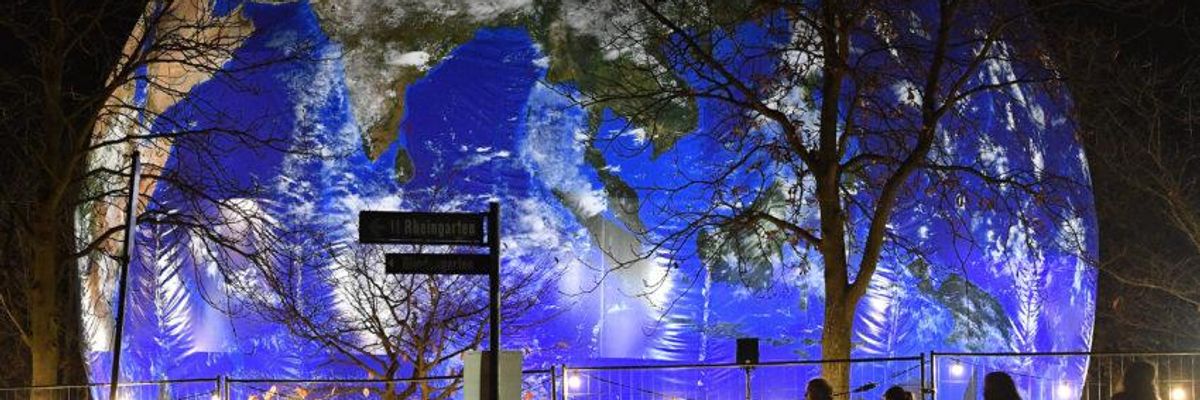
The German pavilion in the shape of the earth at the climate change conference in Bonn, Germany. (Photo: Martin Meissner / AP)
Climate change, the most important issue currently affecting our planet and our species, is the subject of a global conference this week--yet it is barely a blip in media coverage. The 23rd Conference of Parties (COP23), which is the United Nation's annual international gathering on climate change, is taking place this week in Bonn, Germany, co-hosted by both Germany and the island nation of Fiji. As usual, country delegates and their staff are huddled in official meetings and panels while climate justice and environmental activists are attempting to hold them accountable from the outside.
But this year marks a special moment: Less than a year after the historic (but flawed) Paris Climate Accord was agreed upon in December 2015, the largest emitter of greenhouse gas emissions chose a climate change denier as president. Donald Trump quickly moved to undo Barack Obama's commitment to the Paris Climate Accord. Ten months into his presidency, Trump's administration is racing to lighten the regulatory load of polluting mega-corporations and revive the dying coal industry. COP23 attendees perceive an even greater urgency to address climate change within this political context.
U.S.-based climate justice activists who have traveled to COP23 are especially sensitive and more determined than ever to push for grass-roots change in mitigating climate change. One such activist making his voice heard at COP23 is Kali Akuno, co-founder and co-director of Cooperation Jackson (a network for sustainable development in Mississippi), and former executive director of the Peoples' Hurricane Relief Fund, established in New Orleans after Hurricane Katrina. Akuno, who is in Bonn as part of the It Takes Roots delegation, told me in an interview that he and others in his delegation are there "to strengthen the framework that we advanced in Paris two years ago, and that can best be summarized by making the argument to 'keep it in the ground.' " That phrase, which describes what best to do with fossil fuels, has been popularized over several years by leaders in the environmental justice movement and has been echoed at COP23. "There have to be major reductions [in emissions] at the source," Akuno warns, "if we are to keep to the goal of 1.5 degrees warming."
Alarmingly, however, global greenhouse gas emissions have spiked this year for the first time in three years, not because of Trump's election but because of Chinese resurgent reliance on coal. The Trump effect may still come next year or the year after. Regardless, if there is no slowing down and eventual reversal of emissions levels, there is absolutely no hope to mitigate a global climate disaster. As the residents of Houston, Puerto Rico and California realized this year, climate change is a global phenomenon and impacts all of us no matter where the emissions originate.
One climate justice activist who traveled a long way to attend the conference is Chief Ninawa Huni Kui, president of the Federation of the Huni Kui, an indigenous Amazonian tribe based in Acre, Brazil. He shared his insights with me in an interview from Bonn. "We understand what is happening and we believe that mother Earth is powerful, and part of her protests are terrible hurricanes, the flooding, the drought and the erratic seasons," Chief Ninawa said. "They're not talking about Mother Earth here in this conference of parties. They're talking about business, money, capital, carbon credits and fracking, and supposedly [about] offsetting pollution."
When asked how the U.S. withdrawal from the Paris Climate Accord was being felt in Bonn, Akuno explained that it has partly hindered progress but also fueled the determination of nations to power on without the U.S. "Many of us would argue that the United States and the Trump administration not being here to a certain degree has actually opened up more space," he said. "It's eliminated some of the blocks that the United States has traditionally registered." Still, how do you hold the world's economic superpower accountable for its contribution to climate change if its representatives are absent?
The Trump administration did make one appearance at COP23. It was the height of irony that at a global conference devoted to combating climate change, the White House decided to promote the very energy source that fuels climate change by audaciously sponsoring a panel featuring coal, natural gas and nuclear power as "clean" energies. White House energy adviser George Banks spoke alongside industry representatives and corporate fossil fuel executives in pushing the idea that "clean coal" and fracked gas could help reduce greenhouse gas emissions. The panel became a flashpoint for derision and anger from both the international community gathered in Bonn as well as the U.S.-based activists present.
Among those protesting the White House panel were two young indigenous members of Idle No More SF Bay, Isabella Zizi and Daniel Ilario, who are attending the COP23 as part of the same delegation as Akuno. They, too, shared their experience with me in an interview. Zizi described a powerful parade of people who protested the White House panel, and some among them held an impromptu press conference outside the location featuring indigenous representatives from all over the Americas. "That really just told the solid truth about what we have to deal with on the front lines in our own impacted communities when it comes to nuclear waste, fracking and coal."
So embarrassing and inappropriate was the White House panel promoting fossil fuels that even COP23's president, Fijian Prime Minister Frank Bainimarama, told the press, "I really don't want to get into an argument with the United States of America, but we all know what coal does and we all know the effects of coal mining ... we all know what coal does with regard to climate change."
Countering Trump's position on climate are several U.S. state governors who traveled to Bonn to present themselves as the new American leadership on climate. Among them is California Gov. Jerry Brown, who sees himself as a climate hero but who has been roundly criticized for promoting what many call "false solutions" to climate change, such as his state's cap and trade program. At a panel in Bonn, Brown felt the wrath of climate justice protesters (including Ilario) who interrupted his talk with the familiar refrain of "Keep it in the ground." According to Ilario, the irate governor responded, "Let's put you in the ground."
Ilario explained that he led the protest against Brown because, as a resident of the Bay area, his community is exposed to "five refineries that constantly pollute and are seeking to expand." Brown's signature cap-and-trade extension, AB 398, "allows these refineries to expand and it restricts us from the ability to locally cap carbon until 2030," Ilario said.
Brown's flippant response to him was a "shock," Ilario added, because he sees himself as fighting, "to protect the water, to protect the air, so we have a chance at having a next generation because right now that's not certain." Indeed, this year's U.N. climate conference appears similar to past conferences: While civil society representatives vocally demand basic rights to exist without fear of extinction, policy makers congratulate one another on preserving financial markets at the expense of humanity.
Chief Ninawa echoed Ilario's sentiment, saying "We are sad when we see that the governments and corporations are setting the table to get down to auctioning off the animals, buying and selling the plants, buying and selling the water, buying and selling the very air that we breathe." He added, "These gifts that the creator created for all of humanity are being auctioned off at these negotiations."
Ordinary people, who will pay the heaviest price for global warming, far outnumber the powerful political and financial elites trying to silence the masses. Negotiators need reminding that the preservation of financial markets and the energy economy means nothing if large swathes of our species will be wiped out. "There are only one or two governments that are making all the decisions and the people of world's voice isn't being heard," Chief Ninawa said. "Life itself and the future of humanity is at stake."
Trump and Musk are on an unconstitutional rampage, aiming for virtually every corner of the federal government. These two right-wing billionaires are targeting nurses, scientists, teachers, daycare providers, judges, veterans, air traffic controllers, and nuclear safety inspectors. No one is safe. The food stamps program, Social Security, Medicare, and Medicaid are next. It’s an unprecedented disaster and a five-alarm fire, but there will be a reckoning. The people did not vote for this. The American people do not want this dystopian hellscape that hides behind claims of “efficiency.” Still, in reality, it is all a giveaway to corporate interests and the libertarian dreams of far-right oligarchs like Musk. Common Dreams is playing a vital role by reporting day and night on this orgy of corruption and greed, as well as what everyday people can do to organize and fight back. As a people-powered nonprofit news outlet, we cover issues the corporate media never will, but we can only continue with our readers’ support. |
Climate change, the most important issue currently affecting our planet and our species, is the subject of a global conference this week--yet it is barely a blip in media coverage. The 23rd Conference of Parties (COP23), which is the United Nation's annual international gathering on climate change, is taking place this week in Bonn, Germany, co-hosted by both Germany and the island nation of Fiji. As usual, country delegates and their staff are huddled in official meetings and panels while climate justice and environmental activists are attempting to hold them accountable from the outside.
But this year marks a special moment: Less than a year after the historic (but flawed) Paris Climate Accord was agreed upon in December 2015, the largest emitter of greenhouse gas emissions chose a climate change denier as president. Donald Trump quickly moved to undo Barack Obama's commitment to the Paris Climate Accord. Ten months into his presidency, Trump's administration is racing to lighten the regulatory load of polluting mega-corporations and revive the dying coal industry. COP23 attendees perceive an even greater urgency to address climate change within this political context.
U.S.-based climate justice activists who have traveled to COP23 are especially sensitive and more determined than ever to push for grass-roots change in mitigating climate change. One such activist making his voice heard at COP23 is Kali Akuno, co-founder and co-director of Cooperation Jackson (a network for sustainable development in Mississippi), and former executive director of the Peoples' Hurricane Relief Fund, established in New Orleans after Hurricane Katrina. Akuno, who is in Bonn as part of the It Takes Roots delegation, told me in an interview that he and others in his delegation are there "to strengthen the framework that we advanced in Paris two years ago, and that can best be summarized by making the argument to 'keep it in the ground.' " That phrase, which describes what best to do with fossil fuels, has been popularized over several years by leaders in the environmental justice movement and has been echoed at COP23. "There have to be major reductions [in emissions] at the source," Akuno warns, "if we are to keep to the goal of 1.5 degrees warming."
Alarmingly, however, global greenhouse gas emissions have spiked this year for the first time in three years, not because of Trump's election but because of Chinese resurgent reliance on coal. The Trump effect may still come next year or the year after. Regardless, if there is no slowing down and eventual reversal of emissions levels, there is absolutely no hope to mitigate a global climate disaster. As the residents of Houston, Puerto Rico and California realized this year, climate change is a global phenomenon and impacts all of us no matter where the emissions originate.
One climate justice activist who traveled a long way to attend the conference is Chief Ninawa Huni Kui, president of the Federation of the Huni Kui, an indigenous Amazonian tribe based in Acre, Brazil. He shared his insights with me in an interview from Bonn. "We understand what is happening and we believe that mother Earth is powerful, and part of her protests are terrible hurricanes, the flooding, the drought and the erratic seasons," Chief Ninawa said. "They're not talking about Mother Earth here in this conference of parties. They're talking about business, money, capital, carbon credits and fracking, and supposedly [about] offsetting pollution."
When asked how the U.S. withdrawal from the Paris Climate Accord was being felt in Bonn, Akuno explained that it has partly hindered progress but also fueled the determination of nations to power on without the U.S. "Many of us would argue that the United States and the Trump administration not being here to a certain degree has actually opened up more space," he said. "It's eliminated some of the blocks that the United States has traditionally registered." Still, how do you hold the world's economic superpower accountable for its contribution to climate change if its representatives are absent?
The Trump administration did make one appearance at COP23. It was the height of irony that at a global conference devoted to combating climate change, the White House decided to promote the very energy source that fuels climate change by audaciously sponsoring a panel featuring coal, natural gas and nuclear power as "clean" energies. White House energy adviser George Banks spoke alongside industry representatives and corporate fossil fuel executives in pushing the idea that "clean coal" and fracked gas could help reduce greenhouse gas emissions. The panel became a flashpoint for derision and anger from both the international community gathered in Bonn as well as the U.S.-based activists present.
Among those protesting the White House panel were two young indigenous members of Idle No More SF Bay, Isabella Zizi and Daniel Ilario, who are attending the COP23 as part of the same delegation as Akuno. They, too, shared their experience with me in an interview. Zizi described a powerful parade of people who protested the White House panel, and some among them held an impromptu press conference outside the location featuring indigenous representatives from all over the Americas. "That really just told the solid truth about what we have to deal with on the front lines in our own impacted communities when it comes to nuclear waste, fracking and coal."
So embarrassing and inappropriate was the White House panel promoting fossil fuels that even COP23's president, Fijian Prime Minister Frank Bainimarama, told the press, "I really don't want to get into an argument with the United States of America, but we all know what coal does and we all know the effects of coal mining ... we all know what coal does with regard to climate change."
Countering Trump's position on climate are several U.S. state governors who traveled to Bonn to present themselves as the new American leadership on climate. Among them is California Gov. Jerry Brown, who sees himself as a climate hero but who has been roundly criticized for promoting what many call "false solutions" to climate change, such as his state's cap and trade program. At a panel in Bonn, Brown felt the wrath of climate justice protesters (including Ilario) who interrupted his talk with the familiar refrain of "Keep it in the ground." According to Ilario, the irate governor responded, "Let's put you in the ground."
Ilario explained that he led the protest against Brown because, as a resident of the Bay area, his community is exposed to "five refineries that constantly pollute and are seeking to expand." Brown's signature cap-and-trade extension, AB 398, "allows these refineries to expand and it restricts us from the ability to locally cap carbon until 2030," Ilario said.
Brown's flippant response to him was a "shock," Ilario added, because he sees himself as fighting, "to protect the water, to protect the air, so we have a chance at having a next generation because right now that's not certain." Indeed, this year's U.N. climate conference appears similar to past conferences: While civil society representatives vocally demand basic rights to exist without fear of extinction, policy makers congratulate one another on preserving financial markets at the expense of humanity.
Chief Ninawa echoed Ilario's sentiment, saying "We are sad when we see that the governments and corporations are setting the table to get down to auctioning off the animals, buying and selling the plants, buying and selling the water, buying and selling the very air that we breathe." He added, "These gifts that the creator created for all of humanity are being auctioned off at these negotiations."
Ordinary people, who will pay the heaviest price for global warming, far outnumber the powerful political and financial elites trying to silence the masses. Negotiators need reminding that the preservation of financial markets and the energy economy means nothing if large swathes of our species will be wiped out. "There are only one or two governments that are making all the decisions and the people of world's voice isn't being heard," Chief Ninawa said. "Life itself and the future of humanity is at stake."
Climate change, the most important issue currently affecting our planet and our species, is the subject of a global conference this week--yet it is barely a blip in media coverage. The 23rd Conference of Parties (COP23), which is the United Nation's annual international gathering on climate change, is taking place this week in Bonn, Germany, co-hosted by both Germany and the island nation of Fiji. As usual, country delegates and their staff are huddled in official meetings and panels while climate justice and environmental activists are attempting to hold them accountable from the outside.
But this year marks a special moment: Less than a year after the historic (but flawed) Paris Climate Accord was agreed upon in December 2015, the largest emitter of greenhouse gas emissions chose a climate change denier as president. Donald Trump quickly moved to undo Barack Obama's commitment to the Paris Climate Accord. Ten months into his presidency, Trump's administration is racing to lighten the regulatory load of polluting mega-corporations and revive the dying coal industry. COP23 attendees perceive an even greater urgency to address climate change within this political context.
U.S.-based climate justice activists who have traveled to COP23 are especially sensitive and more determined than ever to push for grass-roots change in mitigating climate change. One such activist making his voice heard at COP23 is Kali Akuno, co-founder and co-director of Cooperation Jackson (a network for sustainable development in Mississippi), and former executive director of the Peoples' Hurricane Relief Fund, established in New Orleans after Hurricane Katrina. Akuno, who is in Bonn as part of the It Takes Roots delegation, told me in an interview that he and others in his delegation are there "to strengthen the framework that we advanced in Paris two years ago, and that can best be summarized by making the argument to 'keep it in the ground.' " That phrase, which describes what best to do with fossil fuels, has been popularized over several years by leaders in the environmental justice movement and has been echoed at COP23. "There have to be major reductions [in emissions] at the source," Akuno warns, "if we are to keep to the goal of 1.5 degrees warming."
Alarmingly, however, global greenhouse gas emissions have spiked this year for the first time in three years, not because of Trump's election but because of Chinese resurgent reliance on coal. The Trump effect may still come next year or the year after. Regardless, if there is no slowing down and eventual reversal of emissions levels, there is absolutely no hope to mitigate a global climate disaster. As the residents of Houston, Puerto Rico and California realized this year, climate change is a global phenomenon and impacts all of us no matter where the emissions originate.
One climate justice activist who traveled a long way to attend the conference is Chief Ninawa Huni Kui, president of the Federation of the Huni Kui, an indigenous Amazonian tribe based in Acre, Brazil. He shared his insights with me in an interview from Bonn. "We understand what is happening and we believe that mother Earth is powerful, and part of her protests are terrible hurricanes, the flooding, the drought and the erratic seasons," Chief Ninawa said. "They're not talking about Mother Earth here in this conference of parties. They're talking about business, money, capital, carbon credits and fracking, and supposedly [about] offsetting pollution."
When asked how the U.S. withdrawal from the Paris Climate Accord was being felt in Bonn, Akuno explained that it has partly hindered progress but also fueled the determination of nations to power on without the U.S. "Many of us would argue that the United States and the Trump administration not being here to a certain degree has actually opened up more space," he said. "It's eliminated some of the blocks that the United States has traditionally registered." Still, how do you hold the world's economic superpower accountable for its contribution to climate change if its representatives are absent?
The Trump administration did make one appearance at COP23. It was the height of irony that at a global conference devoted to combating climate change, the White House decided to promote the very energy source that fuels climate change by audaciously sponsoring a panel featuring coal, natural gas and nuclear power as "clean" energies. White House energy adviser George Banks spoke alongside industry representatives and corporate fossil fuel executives in pushing the idea that "clean coal" and fracked gas could help reduce greenhouse gas emissions. The panel became a flashpoint for derision and anger from both the international community gathered in Bonn as well as the U.S.-based activists present.
Among those protesting the White House panel were two young indigenous members of Idle No More SF Bay, Isabella Zizi and Daniel Ilario, who are attending the COP23 as part of the same delegation as Akuno. They, too, shared their experience with me in an interview. Zizi described a powerful parade of people who protested the White House panel, and some among them held an impromptu press conference outside the location featuring indigenous representatives from all over the Americas. "That really just told the solid truth about what we have to deal with on the front lines in our own impacted communities when it comes to nuclear waste, fracking and coal."
So embarrassing and inappropriate was the White House panel promoting fossil fuels that even COP23's president, Fijian Prime Minister Frank Bainimarama, told the press, "I really don't want to get into an argument with the United States of America, but we all know what coal does and we all know the effects of coal mining ... we all know what coal does with regard to climate change."
Countering Trump's position on climate are several U.S. state governors who traveled to Bonn to present themselves as the new American leadership on climate. Among them is California Gov. Jerry Brown, who sees himself as a climate hero but who has been roundly criticized for promoting what many call "false solutions" to climate change, such as his state's cap and trade program. At a panel in Bonn, Brown felt the wrath of climate justice protesters (including Ilario) who interrupted his talk with the familiar refrain of "Keep it in the ground." According to Ilario, the irate governor responded, "Let's put you in the ground."
Ilario explained that he led the protest against Brown because, as a resident of the Bay area, his community is exposed to "five refineries that constantly pollute and are seeking to expand." Brown's signature cap-and-trade extension, AB 398, "allows these refineries to expand and it restricts us from the ability to locally cap carbon until 2030," Ilario said.
Brown's flippant response to him was a "shock," Ilario added, because he sees himself as fighting, "to protect the water, to protect the air, so we have a chance at having a next generation because right now that's not certain." Indeed, this year's U.N. climate conference appears similar to past conferences: While civil society representatives vocally demand basic rights to exist without fear of extinction, policy makers congratulate one another on preserving financial markets at the expense of humanity.
Chief Ninawa echoed Ilario's sentiment, saying "We are sad when we see that the governments and corporations are setting the table to get down to auctioning off the animals, buying and selling the plants, buying and selling the water, buying and selling the very air that we breathe." He added, "These gifts that the creator created for all of humanity are being auctioned off at these negotiations."
Ordinary people, who will pay the heaviest price for global warming, far outnumber the powerful political and financial elites trying to silence the masses. Negotiators need reminding that the preservation of financial markets and the energy economy means nothing if large swathes of our species will be wiped out. "There are only one or two governments that are making all the decisions and the people of world's voice isn't being heard," Chief Ninawa said. "Life itself and the future of humanity is at stake."
"Thank you to the hundreds of thousands of Americans across the country who are standing up and speaking out for our voting rights, fundamental freedoms, and essential services like Social Security and Medicare."
In communities large and small across the United States on Saturday, hundreds of thousands of people collectively took to the streets to make their opposition to President Donald Trump heard.
The people who took part in the organized protests ranged from very young children to the elderly and their message was scrawled on signs of all sizes and colors—many of them angry, some of them funny, but all in line with the "Hands Off" message that brought them together.
"Thank you to the hundreds of thousands of Americans across the country who are standing up and speaking out for our voting rights, fundamental freedoms, and essential services like Social Security and Medicare," said the group Stand Up America as word of the turnout poured in from across the country.
A relatively small, but representative sample of photographs from various demonstrations that took place follows.
Demonstrators gather on Boston Common, cheering and chanting slogans, during the nationwide "Hands Off!" protest against US President Donald Trump and his advisor, Tesla CEO Elon Musk, in Boston, Massachusetts on April 5, 2025. (Photo by Joseph Prezioso / AFP)
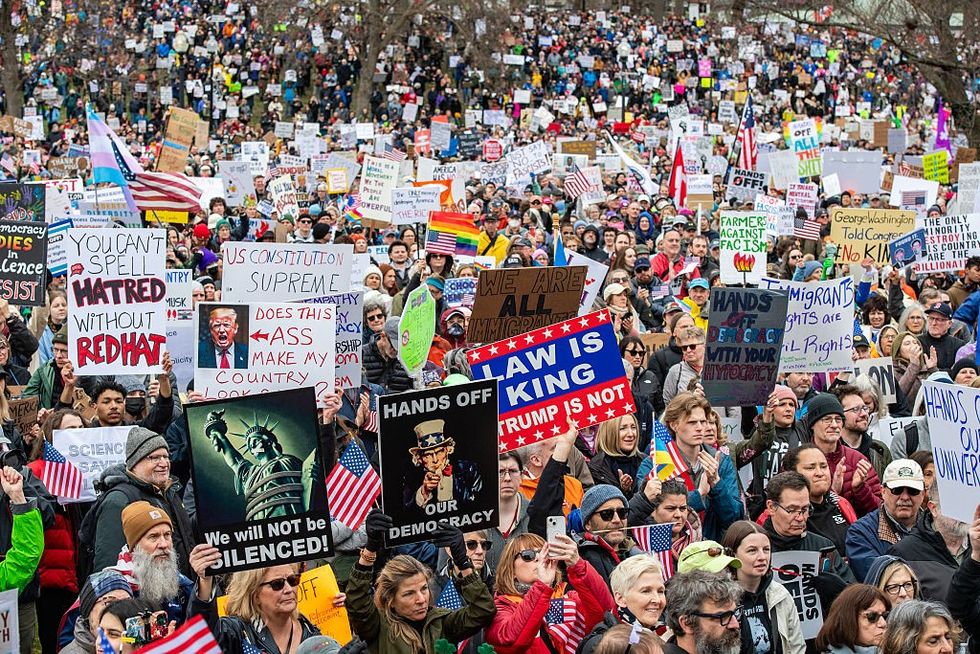
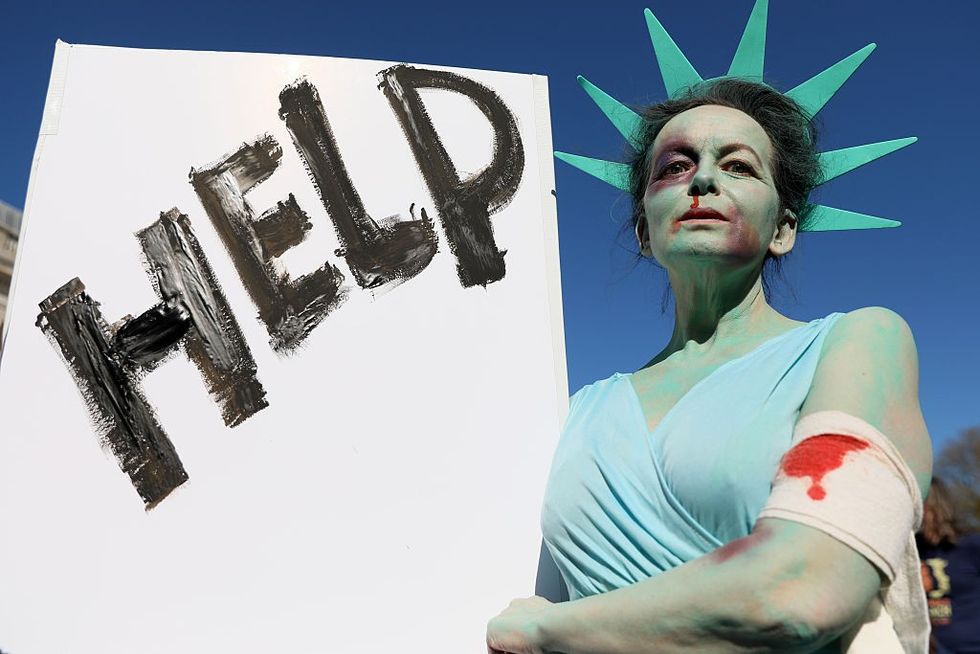
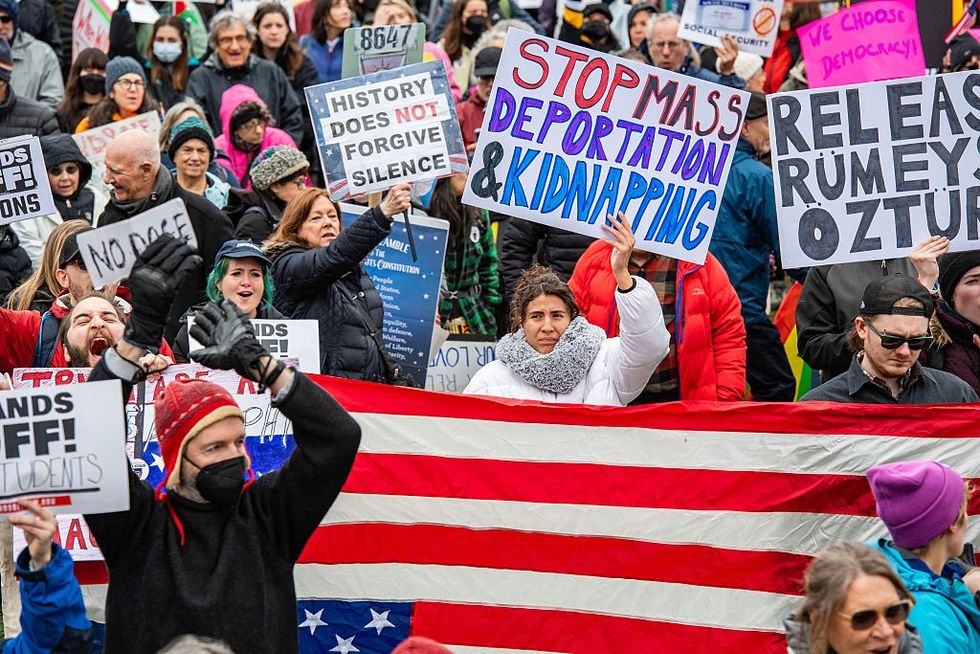
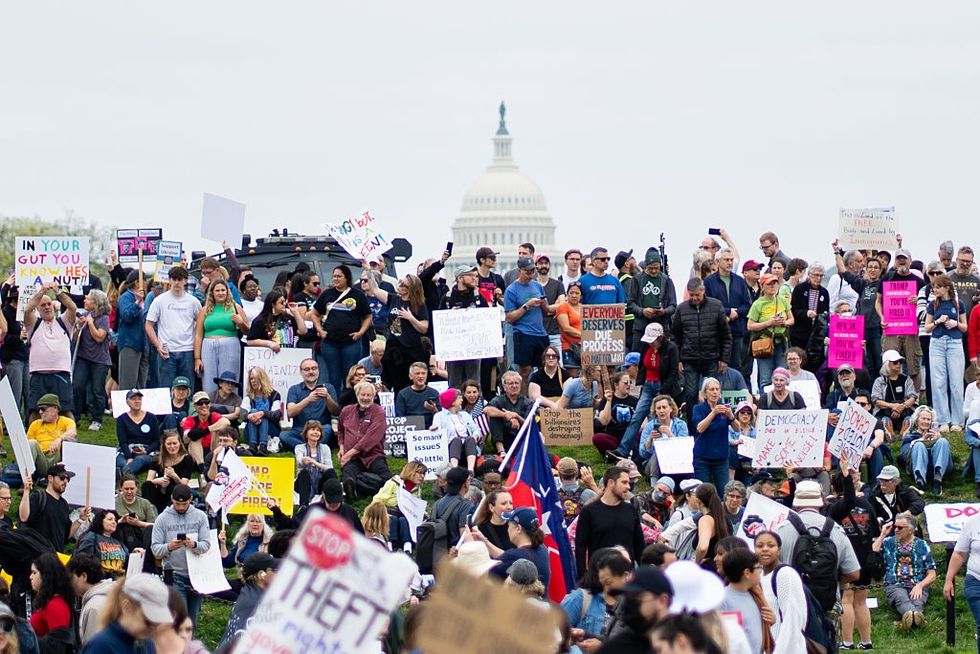
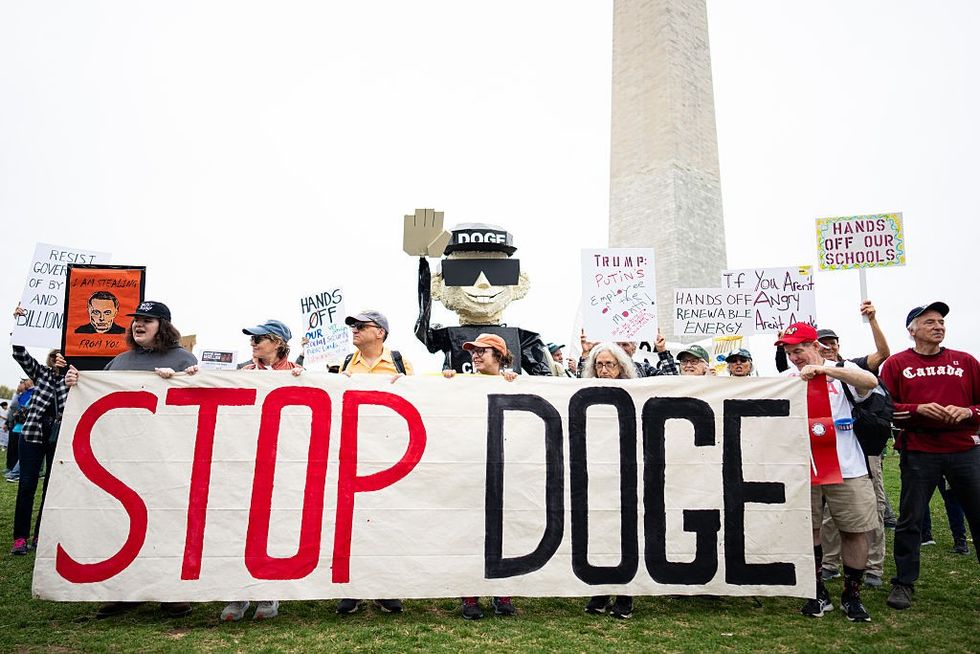
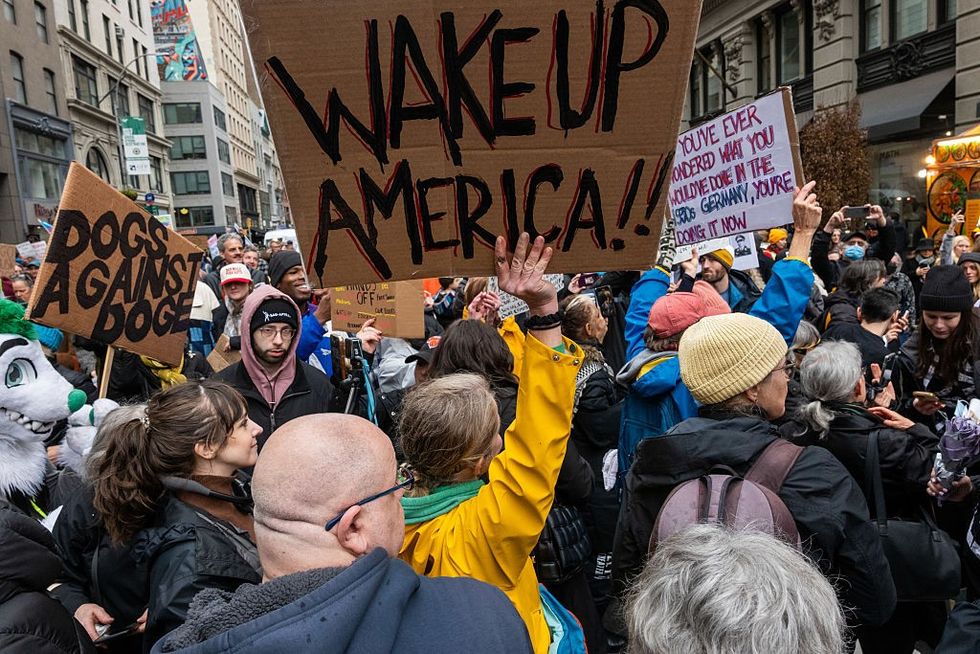
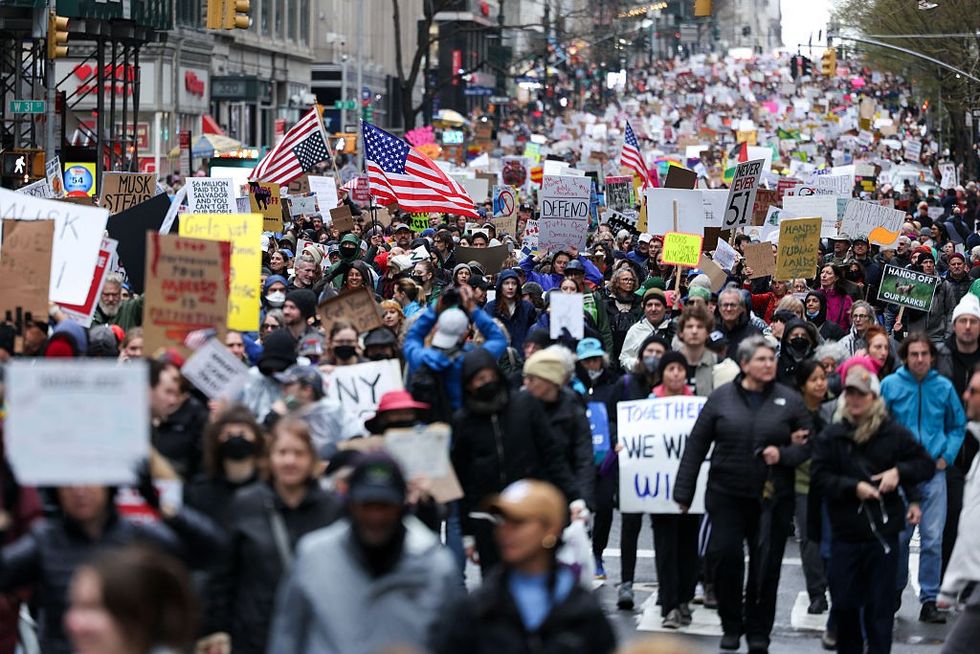
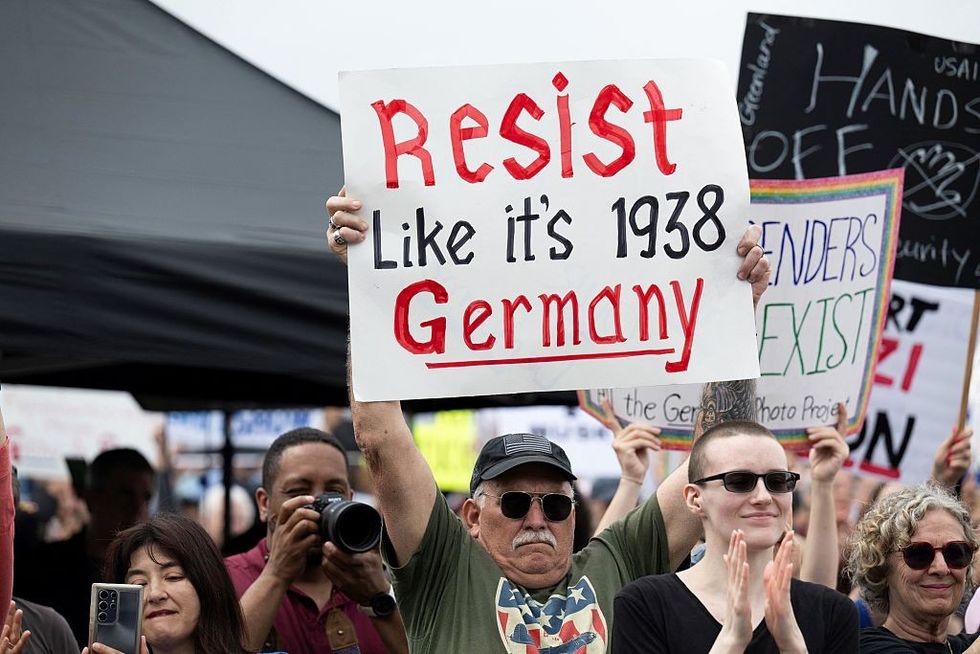
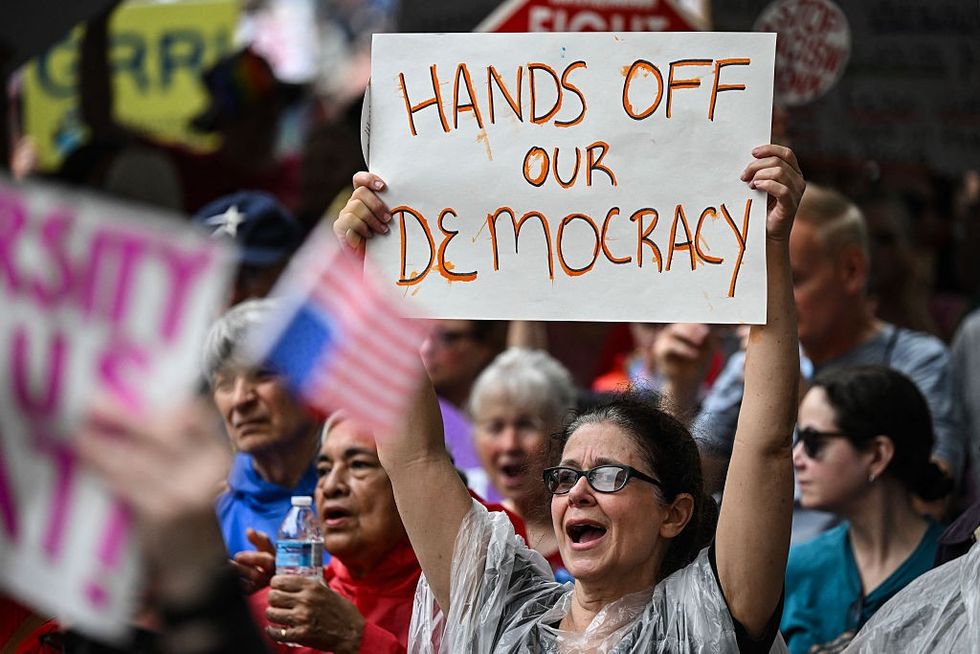
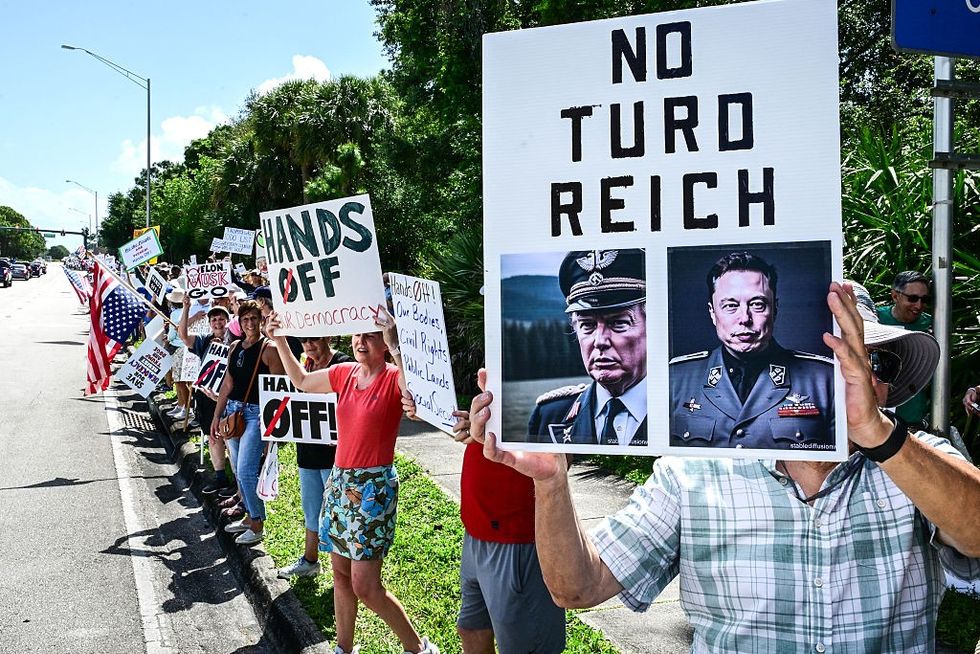
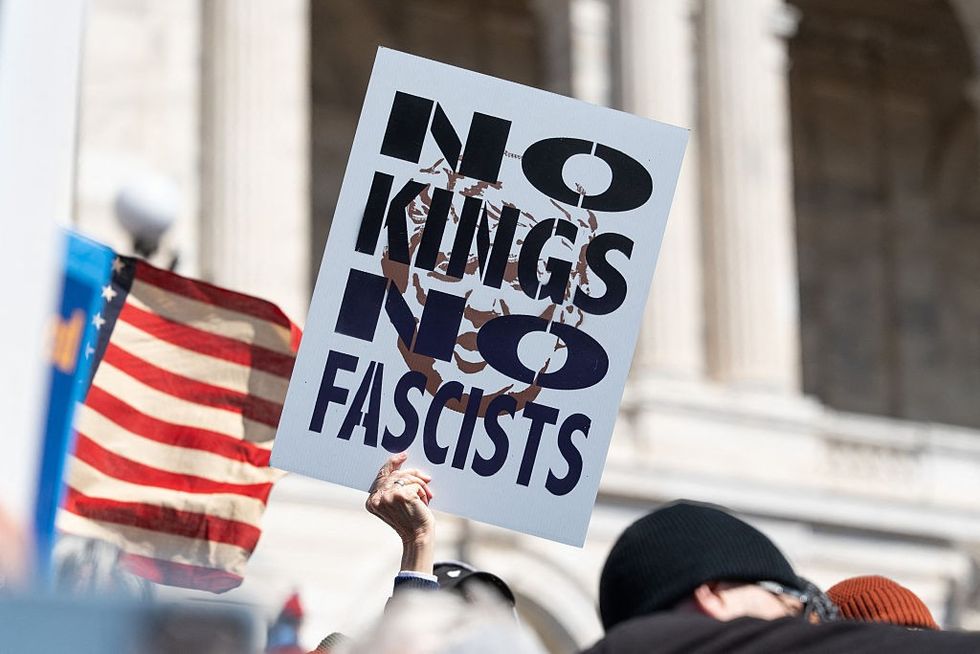
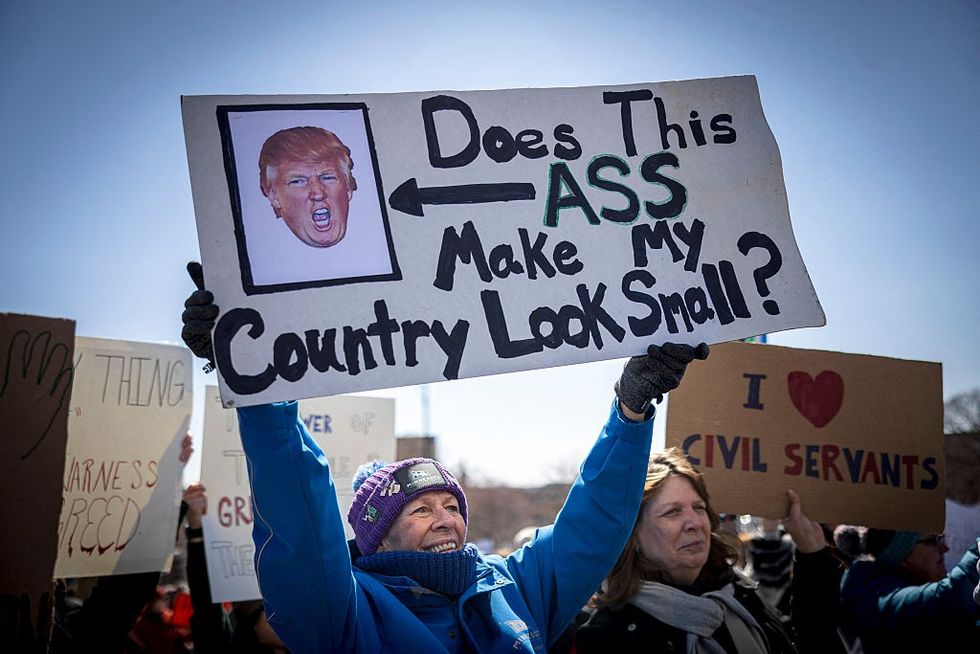
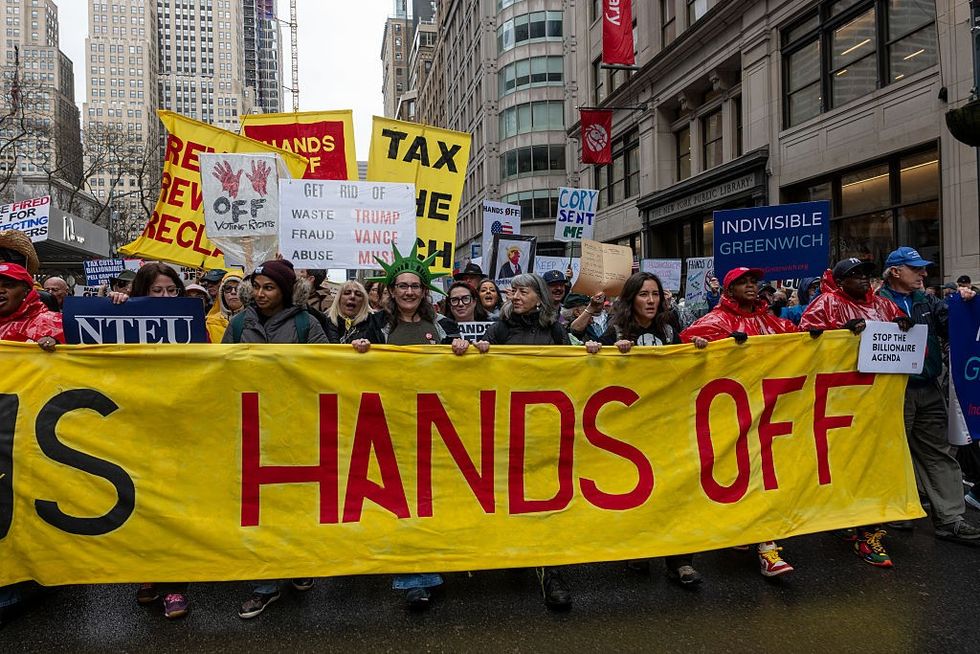
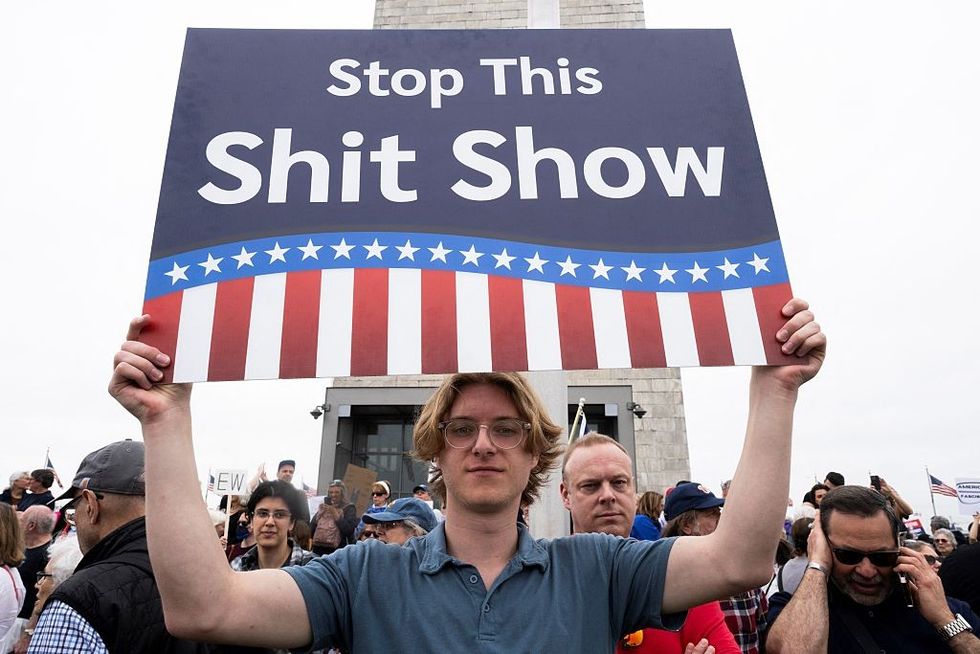
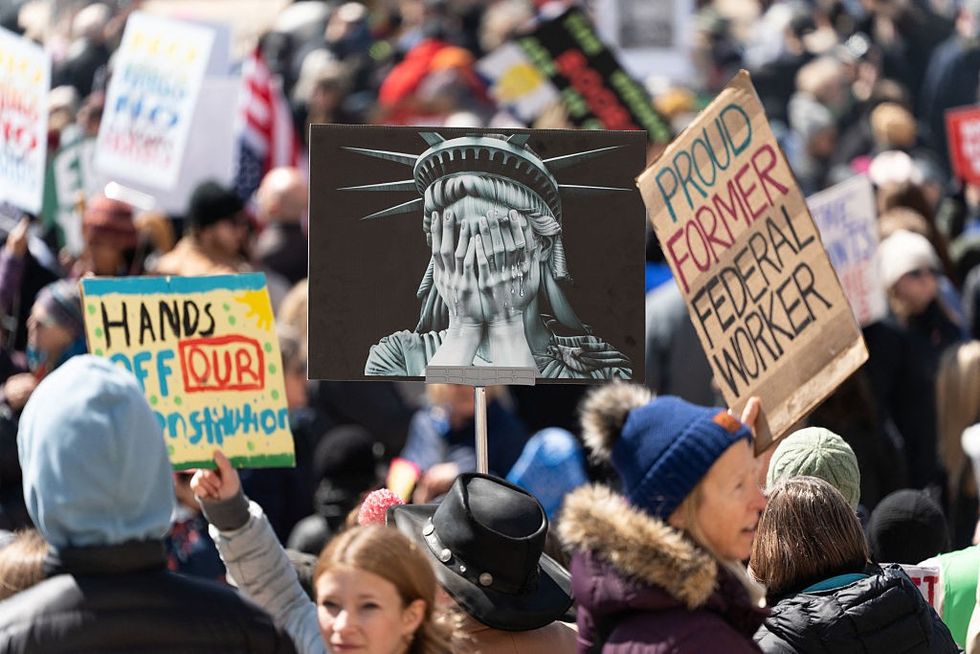
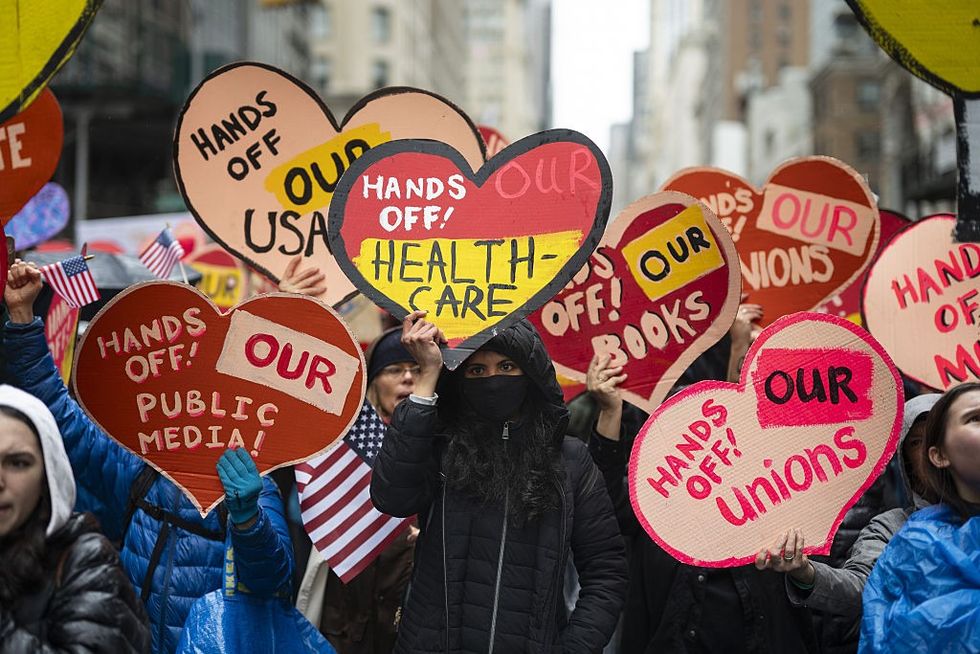
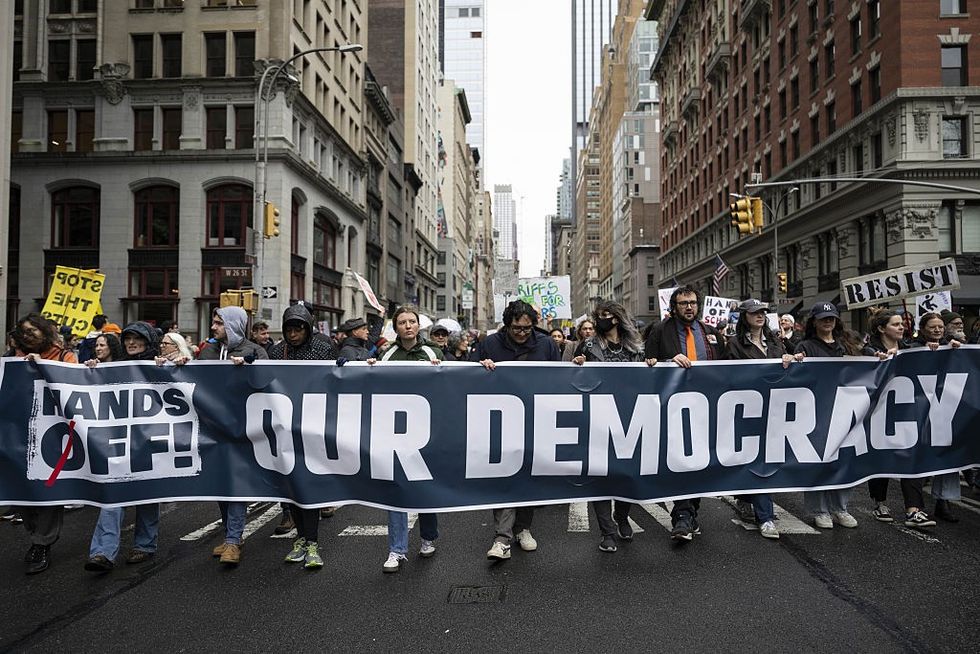
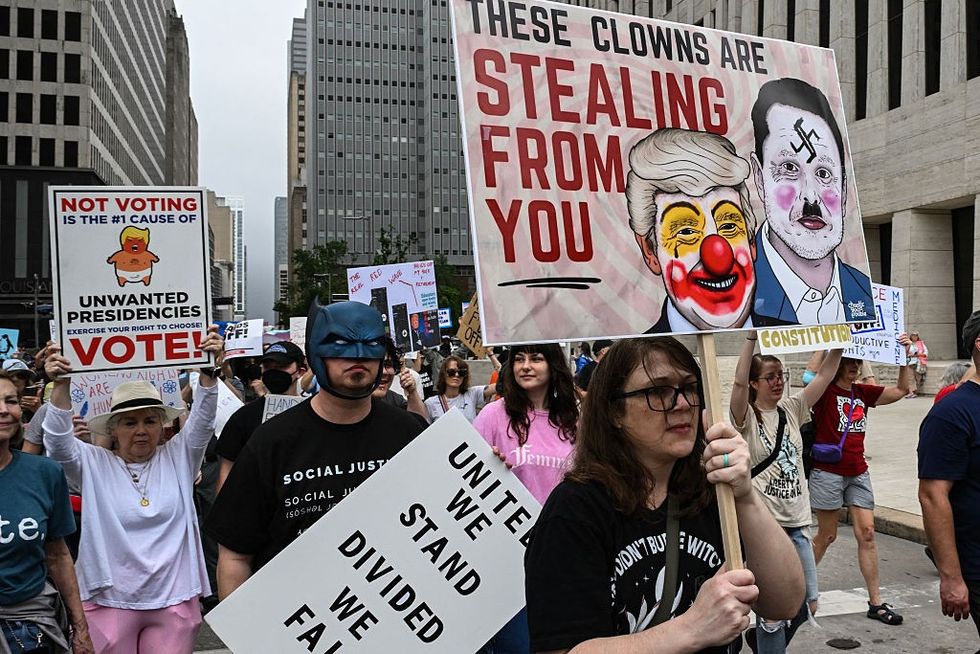
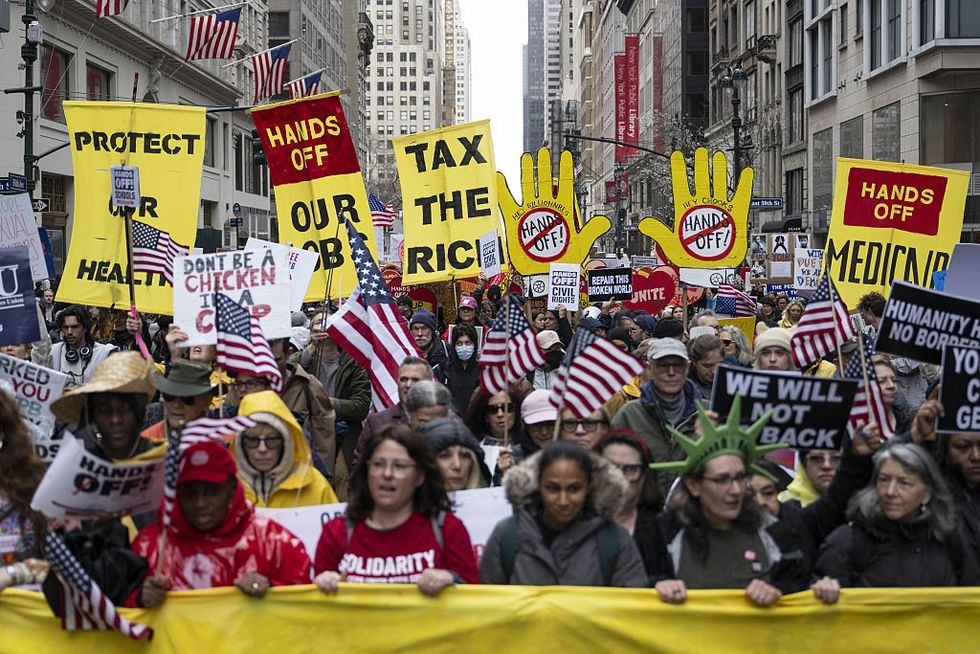
"Everyone involved in this crime against humanity, and everyone who covered it up, would face prosecution in a world that had any shred of dignity left."
A video presented to officials at the United Nations on Friday and first made public Saturday by the New York Times provides more evidence that the recent massacre of Palestinian medics in Gaza did not happen the way Israeli government claimed—the latest in a long line of deception when it comes to violence against civilians that have led to repeated accusations of war crimes.
The video, according to the Palestine Red Crescent Society (PRCS), was found on the phone of a paramedic found in a mass grave with a bullet in his head after being killed, along with seven other medics, by Israeli forces on March 23. The eight medics, buried in the shallow grave with the bodies riddled with bullets, were: Mustafa Khafaja, Ezz El-Din Shaat, Saleh Muammar, Refaat Radwan, Muhammad Bahloul, Ashraf Abu Libda, Muhammad Al-Hila, and Raed Al-Sharif. The video reportedly belonged to Radwan. A ninth medic, identified as Asaad Al-Nasasra, who was at the scene of the massacre, which took place near the southern city of Rafah, is still missing.
The PRCS said it presented the video—which refutes the explanation of the killings offered by Israeli officials—to members of the UN Security Council on Friday.
"They were killed in their uniforms. Driving their clearly marked vehicles. Wearing their gloves. On their way to save lives," Jonathan Whittall, head of the UN's humanitarian affairs office in Palestine, said last week after the bodies were discovered. Some of the victims, according to Gaza officials, were found with handcuffs still on them and appeared to have been shot in the head, execution-style.
The Israeli military initially said its soldiers "did not randomly attack" any ambulances, but rather claimed they fired on "terrorists" who approached them in "suspicious vehicles." Lt. Col. Nadav Shoshani, an IDF spokesperson, said the vehicles that the soldiers opened fire on were driving with their lights off and did not have clearance to be in the area. The video evidence directly contradicts the IDF's version of events.
As the Times reports:
The Times obtained the video from a senior diplomat at the United Nations who asked not to be identified to be able to share sensitive information.
The Times verified the location and timing of the video, which was taken in the southern city of Rafah early on March 23. Filmed from what appears to be the front interior of a moving vehicle, it shows a convoy of ambulances and a fire truck, clearly marked, with headlights and flashing lights turned on, driving south on a road to the north of Rafah in the early morning. The first rays of sun can be seen, and birds are chirping.
In an interview with Drop Site News published Friday, the only known paramedic to survive the attack, Munther Abed, explained that he and his colleagues "were directly and deliberately shot at" by the IDF. "The car is clearly marked with 'Palestinian Red Crescent Society 101.' The car's number was clear and the crews' uniform was clear, so why were we directly shot at? That is the question."
The video's release sparked fresh outrage and demands for accountability on Saturday.
"The IDF denied access to the site for days; they sent in diggers to cover up the massacre and intentionally lied about it," said podcast producer Hamza M. Syed in reaction to the new revelations. "The entire leadership of the Israeli army is implicated in this unconscionable war crime. And they must be prosecuted."
"Everyone involved in this crime against humanity, and everyone who covered it up, would face prosecution in a world that had any shred of dignity left," said journalist Ryan Grim of DropSite News.
"They're dismantling our country. They're looting our government. And they think we'll just watch."
In communities across the United States and also overseas, coordinated "Hands Off" protests are taking place far and wide Saturday in the largest public rebuke yet to President Donald Trump and top henchman Elon Musk's assault on the workings of the federal government and their program of economic sabotage that is sacrificing the needs of working families to authoritarianism and the greed of right-wing oligarchs.
Indivisible, one of the key organizing groups behind the day's protests, said millions participated in more than 1,300 individual rallies as they demanded "an end to Trump's authoritarian power grab" and condemning all those aiding and abetting it.
"We expected hundreds of thousands. But at virtually every single event, the crowds eclipsed our estimates," the group said in a statement Saturday evening.
"Hands off our healthcare, hands off our civil rights, hands off our schools, our freedoms, and our democracy."
"This is the largest day of protest since Trump retook office," the group added. "And in many small towns and cities, activists are reporting the biggest protests their communities have ever seen as everyday people send a clear, unmistakable message to Trump and Musk: Hands off our healthcare, hands off our civil rights, hands off our schools, our freedoms, and our democracy."
According to the organizers' call to action:
They're dismantling our country. They’re looting our government. And they think we'll just watch.
On Saturday, April 5th, we rise up with one demand: Hands Off!
This is a nationwide mobilization to stop the most brazen power grab in modern history. Trump, Musk, and their billionaire cronies are orchestrating an all-out assault on our government, our economy, and our basic rights—enabled by Congress every step of the way. They want to strip America for parts—shuttering Social Security offices, firing essential workers, eliminating consumer protections, and gutting Medicaid—all to bankroll their billionaire tax scam.
They're handing over our tax dollars, our public services, and our democracy to the ultra-rich. If we don't fight now, there won’t be anything left to save.
The more than 1,300 "Hands Off!" demonstrations—organized by a large coalition of unions, progressive advocacy groups, and pro-democracy watchdogs—first kicked off Saturday in Europe, followed by East Coast communities in the U.S., and continued throughout the day at various times, depending on location. See here for a list of scheduled "Hands Off" events.
"The United States has a president, not a king," said the progressive advocacy group People's Action, one of the group's involved in the actions, in an email to supporters Saturday morning just as protest events kicked off in hundreds of cities and communities. "Donald Trump has, by every measure, been working to make himself a king. He has become unanswerable to the courts, Congress, and the American people."
In its Saturday evening statement, Indivisible said the actions far exceeded their expectations and should be seen as a turning point in the battle to stop Trump and his minions:
The Trump administration has spent its first 75 days in office trying to overwhelm us, to make us feel powerless, so that we will fall in line, accept the ransacking of our government, the raiding of our social safety net, and the dismantling of our democracy.
And too often, the response from our leaders and those in positions to resist has been abject cowardice. Compliance. Obeying in advance.
But not today. Today we've demonstrated a different path forward. We've modeled the courage and action that we want to see from our leaders, and showed all those who've been standing on the sidelines who share our values that they are not alone.
Citing the Republican president's thirst for "power and greed," People's Action earlier explained why organized pressure must be built and sustained against the administration, especially at the conclusion of a week in which the global economy was spun into disarray by Trump's tariff announcement, his attack on the rule of law continued, and the twice-elected president admitted he was "not joking" about the possibility of seeking a third term, which is barred by the constitution.
"He is destroying the economy with tariffs in order to pay for the tax cuts he wants to push through to enrich himself and his billionaire buddies," warned People's Action. "He has ordered the government to round up innocent people off of the streets and put them in detention centers without due process because they dared to speak out using their First Amendment rights. And he is not close to being done—by his own admission, he is planning to run for a third term, which the Constitution does not allow."
Live stream of Hands Off rally in Washington, D.C.:
Below are photo or video dispatches from demonstrations around the world on Saturday. Check back for updates...
United Kingdom
France
Germany
Belgium:
Massachusetts:
Maine:
Washington, D.C.:
New York:
Minnesota:
Michigan:
Ohio:
Colorado:
Pennsylvania:
North Carolina:
The protest organizers warn that what Trump and Musk are up to "is not just corruption" and "not just mismanagement," but something far more sinister.
"This is a hostile takeover," they said, but vowed to fight back. "This is the moment where we say NO. No more looting, no more stealing, no more billionaires raiding our government while working people struggle to survive."